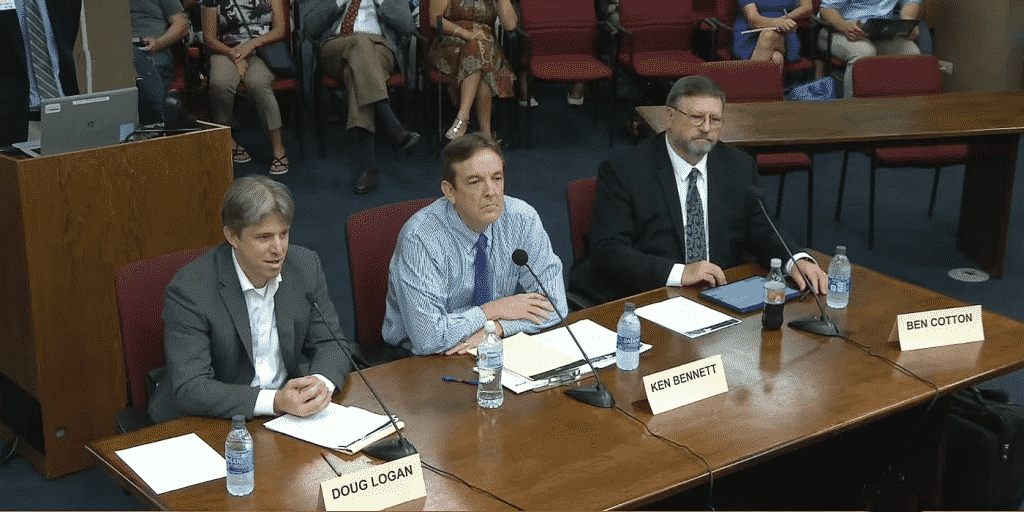With Democrats ratcheting up the pressure on their war against election integrity and several states waiting in the wings to see what happens, Arizona‘s state Senate held a publicly broadcast hearing Thursday to get updates from three officials overseeing the independent audit of Maricopa County‘s 2.1 million votes.
Although the session was dry and wonkish at times, Cyber Ninjas head Doug Logan made several preliminary bombshell disclosures about ways sloppy administration and bookkeeping might have flipped the outcome of the state, which Democrat Joe Biden officially won by 10,457 votes in the 2020 election.
The auditors and lawmakers participating were careful not to ascribe the discrepancies and irregularities to any sort of malfeasance on the part of local election officials, while noting that their refusal to cooperate had made the process immensely more challenging.
“At no time have we ever implied or inferred that there were any intentional misdoings here,” said Arizona Senate president Karen Fann toward the end of the hearing.
…article continued below
– Advertisement –
Logan—who has faced the brunt of leftist attacks, including, as of Wednesday, a politically motivated investigation against him by the Democrat-run US House Oversight Committee—also emphasized that there was much work left to be done to ensure that the auditors’ work was irrefutable and “beyond reproach” when it formally released its findings.
“We totally understand how much focus is on us right now and how important this is to our country,” he said.
But he said that the findings left a lot of questions for Maricopa’s Board of Supervisors and other election officials to answer.
Among those was an explanation as to why and how paper ballots printed on site might have resulted in calibration errors and bleeding due to the use of Sharpies and substandard paper.
…article continued below
– Advertisement –
The issue, colloquially referred to as SharpieGate, surfaced from anecdotal accounts in the immediate wake of the Nov. 3, 2020 election.
It all comes full circle. Now we have a #SharpieGate reference. How many conspiracies are we up to now?
— Maricopa County (@maricopacounty) July 15, 2021
Although Soros-backed Democrat Secretary of State Katie Hobbs downplayed the scandal at the time, Logan confirmed that the problem was real—and might have affected 16 times more ballots than made up Biden’s margin of victory.
The county’s election website boasted that it only used a securer form of heavy-stock paper that would prevent bleeding. But the same was not true, Logan said, for the roughly 168,000 ballots that needed to be printed onsite.
“We are seeing a lot of very thin paper stock being utilized, especially on Election Day,” he said. “…I would expect that with Sharpies the bleedthrough could be greater.”
Likewise, the ballots that were professionally printed in advance showed no calibration errors, while those printed on demand had a greater risk of being off the mark.
Logan also noted several issues pertaining to mail-in ballots and voting rolls that demanded further explanation.
He noted that there were “70,243 mail-in ballots where there is no clear record of them being sent” due to the fact that there were more forms for the receipt of incoming returned ballots than forms for outgoing mailed ones.
Other records showed more ballots being sent to residences than there were official residents.
In all, Logan suggested that the auditors should be permitted to perform door-to-door canvassing on about 74,000 absentee voters to confirm the authenticity and, in some cases clarify the voters’ intent.
“Based on the data we’re seeing, I’d highly recommend that we do the canvassing,” he said. “… I think when we’ve got 74,000 it merits knocking on a door and verifying.”
Democrats, including the federal Justice Department, have made this effort a particular point of contention, accusing the auditors of voter intimidation and threatening to pursue civil-rights charges if they follow through.
Fann noted the irony, however, in the Biden administration’s recent plan to go door-to-door harassing non-vaccinated citizens, and she puzzled how one might be less intimidating than the other.
Two other issues pertained to inaccurate voter rolls, both of which appeared to include numbers beyond Biden’s alleged margin of victory.
Logan said there were 11,326 Maricopa County voters whose names did not show up on a list from Election Day but who were listed a month later, in a Dec. 4 reissue of the voter rolls.
“I cannot think of a logical explanation on what that would be, but that would be a great thing to hear from the county,” he said.
Moreover, roughly 18,000 county residents who voted in the election were quickly removed from the voter rolls in its immediate aftermath.
And another 3,981 voters were discovered to have registered after the Oct. 15 deadline.
Further issues pertained to the signature-verification standards on absentee-ballot envelopes, which saw their “standards reduced over time.”
Initially, the county required 20 points of verification matching with the signature on file, but “eventually they were just told to let every single mail-in ballot through,” Logan said.
Efforts to check the signatures were hindered by the fact that the auditors could not locate a file with the images of the envelopes that was supposed to have been included in the materials delivered as part of the Senate’s initial subpoena.
Also testifying were cybersecurity expert Ben Cotton and former Arizona Secretary of State Ken Bennett, who had volunteered to serve, unpaid, as the Senate liaison in the audit.
Both also testified to the frustration with the sloppy and incomplete materials they had been given by the county.
Cotton noted, for instance, that event logs showed more than 30,000 anonymous queries in March of this year had basically wiped all the data from before February since the files were set only to hold up to 20 megabytes of data.
Along with the lack of record-keeping, he noted that the lack of record-keeping and poor practices such as using the same password for all administrative accounts could have made voting systems vulnerable to hacking in less than 10 minutes.
Bennett testified to the disarray of many of the slips that were supposed to account for how many ballots and duplicate ballots there were per batch. Because some of these lacked serial numbers, it was virtually impossible to tell, in some cases, whether a ballot was the original or a duplicate made for reasons such as damage to the original.
The auditors—who have been hammered for allegedly unreliable work, forcing partisan officials to declare that all of the “compromised” voting machines would need to be replaced—appeared determined to dispel that narrative.
Bennett meticulously outlined the security measures in place, including constant video recording and chain-of-custody procedures, which stood in stark contrast to the lackadaisical procedures that Maricopa officials appeared to have followed.
But those transparency and security measures were essential, as Fann noted, to the fulfillment of the audit’s underlying purpose of helping restore voter confidence in the process.
“This has never been about anything other than election integrity,” she said in her opening address.
“This is the epitome of what America stands for, and if we do not have faith and confidence in our electoral process, then everything we do in life is jeopardized,” she added.



